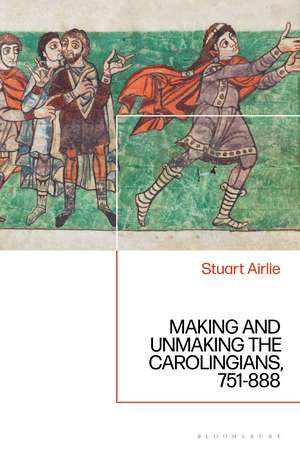Making and Unmaking the Carolingians: 751-888
Autor Stuart Airlieen Limba Engleză Paperback – 27 iul 2022
| Toate formatele și edițiile | Preț | Express |
|---|---|---|
| Paperback (1) | 203.54 lei 6-8 săpt. | +81.85 lei 7-13 zile |
| Bloomsbury Publishing – 27 iul 2022 | 203.54 lei 6-8 săpt. | +81.85 lei 7-13 zile |
| Hardback (1) | 574.43 lei 6-8 săpt. | |
| Bloomsbury Publishing – 27 ian 2021 | 574.43 lei 6-8 săpt. |
Preț: 203.54 lei
Preț vechi: 260.99 lei
-22% Nou
Puncte Express: 305
Preț estimativ în valută:
38.97€ • 40.50$ • 32.31£
38.97€ • 40.50$ • 32.31£
Carte tipărită la comandă
Livrare economică 08-22 februarie 25
Livrare express 04-10 ianuarie 25 pentru 91.84 lei
Preluare comenzi: 021 569.72.76
Specificații
ISBN-13: 9781350189003
ISBN-10: 1350189006
Pagini: 456
Dimensiuni: 156 x 234 x 28 mm
Greutate: 0.64 kg
Editura: Bloomsbury Publishing
Colecția Bloomsbury Academic
Locul publicării:London, United Kingdom
ISBN-10: 1350189006
Pagini: 456
Dimensiuni: 156 x 234 x 28 mm
Greutate: 0.64 kg
Editura: Bloomsbury Publishing
Colecția Bloomsbury Academic
Locul publicării:London, United Kingdom
Caracteristici
Adds nuance to current debates on power and authority in medieval studies
Notă biografică
Stuart Airlie is Senior Lecturer in History at University of Glasgow, UK. He is the author of Power and Its Problems in Carolingian Europe (2012).
Cuprins
PrefaceAcknowledgementsList of AbbreviationsMapsFamily Trees1. A Ruling Family2. Building Carolingian Royalty 751-7683. A House and its Head: the reign of Charlemagne 768-814 4. Child Labour 751-8885. Louis the Pious and the Paranoid Style in Politics6. Lines of Succession and lines of failure, 843-8797. Universal Carolingians: masteries of time and space (751-888)8. Women's Work9. The Loss of Uniqueness: 888 And All ThatBibliographyIndex
Recenzii
Making and Unmaking the Carolingians is a new standard work which assembles the international research into a full panoply.
Stuart Airlie's brilliant examination of the Carolingian dynasty is epic in range and depth. The author investigates how this Frankish ruling family cooperated with the realm's elites to weave a web of structures, activity and ideas that formed the political reality of the Carolingian world. But this book does not stop there. Airlie's narration draws one into this Carolingian reality, uncannily exposing its fabricated nature while simultaneously retelling its history with such ingenuity that the reader often feels they're turning the pages of a Carolingian 'Game of Thrones.' Indeed, this masterful study reveals the workings of early medieval politics, along with the life and death of its most powerful dynasty, as we have never seen them before.
Stuart Airlie takes all the best-known incidents in Carolingian history (and many lesser known ones as well) and rearranges them around a focus on family and dynasticism. The result is a surprising new history not just of the Carolingians but of the entire empire, its aristocracy, its politics, and its transformations. Making and Unmaking the Carolingians is consistently insightful, inventive, and compelling ... and also a pleasure to read.
It would be wrong to spoil the pleasure of reading this brilliantly written book. While shifting the historiographical pendulum back to an approach that was thought to have been abandoned, it avoids the pitfall of going backwards. A memoirist of the French court under the Ancien Régime would not have written anything else.
Stuart Airlie's brilliant examination of the Carolingian dynasty is epic in range and depth. The author investigates how this Frankish ruling family cooperated with the realm's elites to weave a web of structures, activity and ideas that formed the political reality of the Carolingian world. But this book does not stop there. Airlie's narration draws one into this Carolingian reality, uncannily exposing its fabricated nature while simultaneously retelling its history with such ingenuity that the reader often feels they're turning the pages of a Carolingian 'Game of Thrones.' Indeed, this masterful study reveals the workings of early medieval politics, along with the life and death of its most powerful dynasty, as we have never seen them before.
Stuart Airlie takes all the best-known incidents in Carolingian history (and many lesser known ones as well) and rearranges them around a focus on family and dynasticism. The result is a surprising new history not just of the Carolingians but of the entire empire, its aristocracy, its politics, and its transformations. Making and Unmaking the Carolingians is consistently insightful, inventive, and compelling ... and also a pleasure to read.
It would be wrong to spoil the pleasure of reading this brilliantly written book. While shifting the historiographical pendulum back to an approach that was thought to have been abandoned, it avoids the pitfall of going backwards. A memoirist of the French court under the Ancien Régime would not have written anything else.
